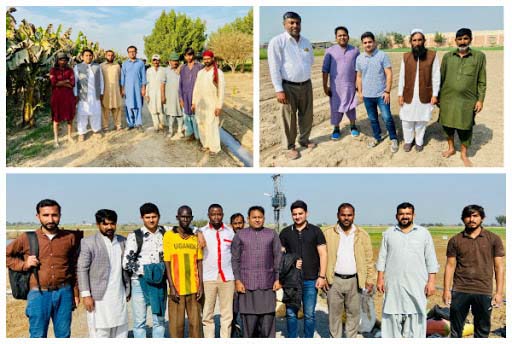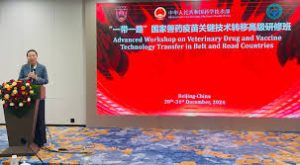China’s maize-soybean strip intercropping technology to demonstrate on 100-acre of land in Pakistan

China Economic Net
Bahawalpur: Maize-soybean strip intercropping technology, an advanced Chinese agricultural technology created high yield of both crops while not occupying extra land, finished its first-phase sowing on 30-acre land of Pakistan. Once the second phase completes in March, this spring the total area of demonstration plots will reach 100 acres, making a giant leap of about 270.4% in comparison with last season’s area.
“In the last one and half months, we traveled 18,000 km across the country to complete sowing. Until now we have demonstrated our technology on 30 acres of land, and in March 70 more acres of land will be sown with soybean varieties from China,” said Muhammad Ali Raza, the post-doc from Sichuan Agricultural University who is promoting the Chinese agricultural technology under Prof. Yang Wenyu and Yang Feng’s support and guidance together with Muhammad Hayder Bin Khalid, another post-doc from the same university.

This season the team has built larger-scale cooperation especially with universities, institutes and local farmers. Four universities, i.e. Sindh Agricultural University, Tandojam, Bahauddin Zakariya University, Multan, University of Agriculture, Faisalabad, and PMAS-Arid Agriculture University, Rawalpindi, and Nuclear Institute for Biotechnology and Genetic Engineering (NIBGE), Faisalabad have joined this season’s demonstration. Moreover, the technology has applied to five farmers’ fields in Sindh and Punjab. Distributed in Hyderabad, Tandojam, Nawabshah, Bahawalpur, Vehari, Multan, Faisalabad, and Chakwal, etc., the aggregated area of the demonstration plots has touched 30 acres of land.
Besides the massively expanded demonstration area, another breakthrough for this season is that some high-yielding soybean varieties from China will arrive Pakistan in the coming month. Then 70 acres of land at Muzaffar Abad and Okara will be sown with those varieties, which are separately provided by NIBGE and Nizami Industries.
Initiated from the year of 2018, maize-soybean strip intercropping technology is becoming increasingly well received in Pakistan, which has attracted widespread attention from both countries’ governments, universities and farmers. “Dr. Gu Wenliang, Agricultural Commissioner of the Chinese Embassy in Pakistan helped us at each and every step for the promotion of this technology. We are in need of Chinese high-yielding soybean varieties, and he is typing hard to bring these seeds from China to Pakistan,” Muhammad Ali Raza said.
With the speedy development of maize-soybean strip intercropping technology in Pakistan, more Pakistani universities and enterprises intend to join the technology’s demonstration.
“Prof. Athar Mehboob, Vice Chancellor of The Islamia University of Bahawalpur, praised Sichuan Agricultural University’s work in Pakistan and expressed his willingness to support the technology’s promotion especially in the irrigated areas of Punjab where we have obtained the highest crop yields of maize and soybean under the intercropping system. An memorandum of understanding (MoU) on student and faculty exchange between the two universities is expected to reach in the near future,” Muhammad Ali Raza told CEN.





